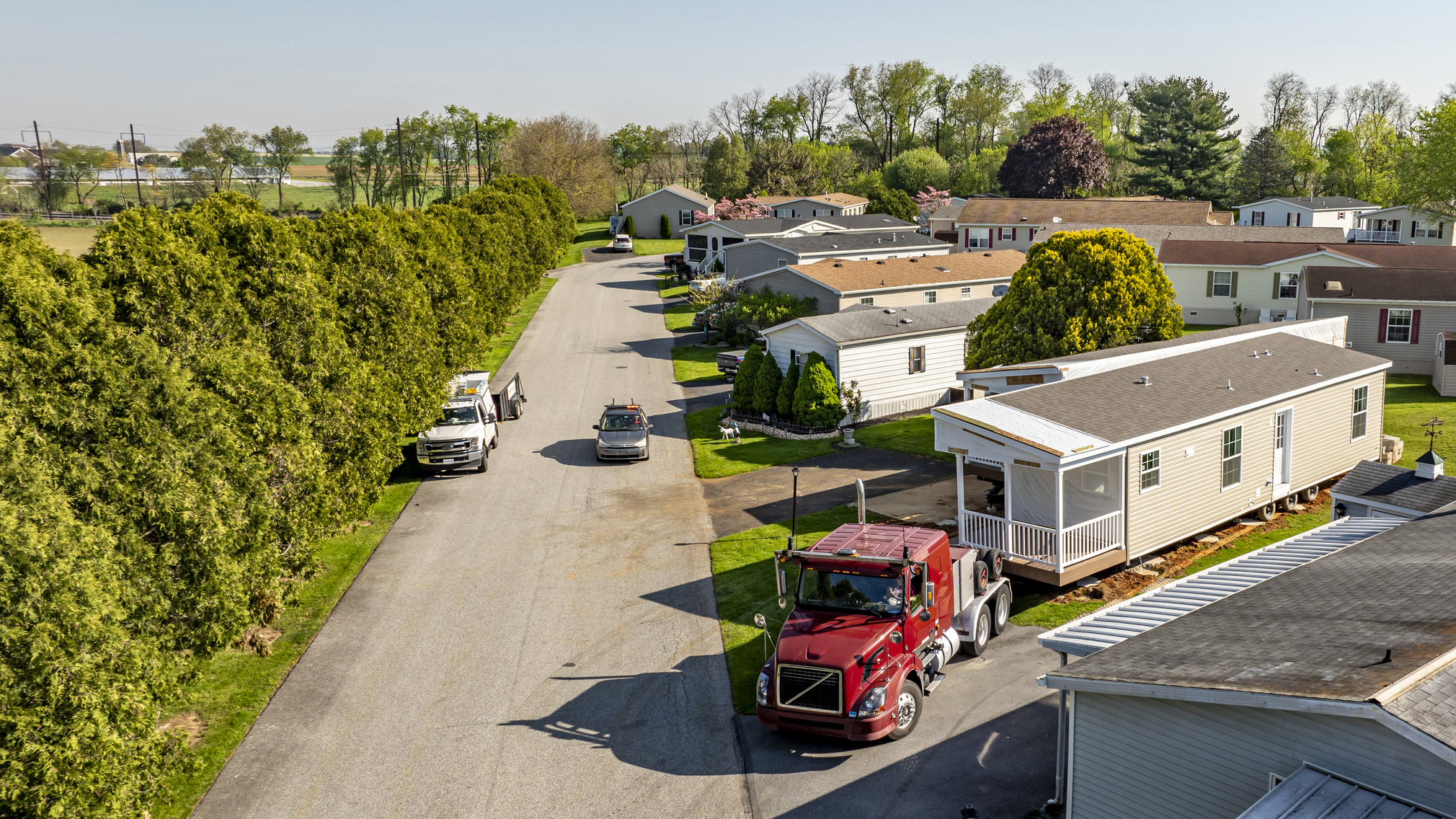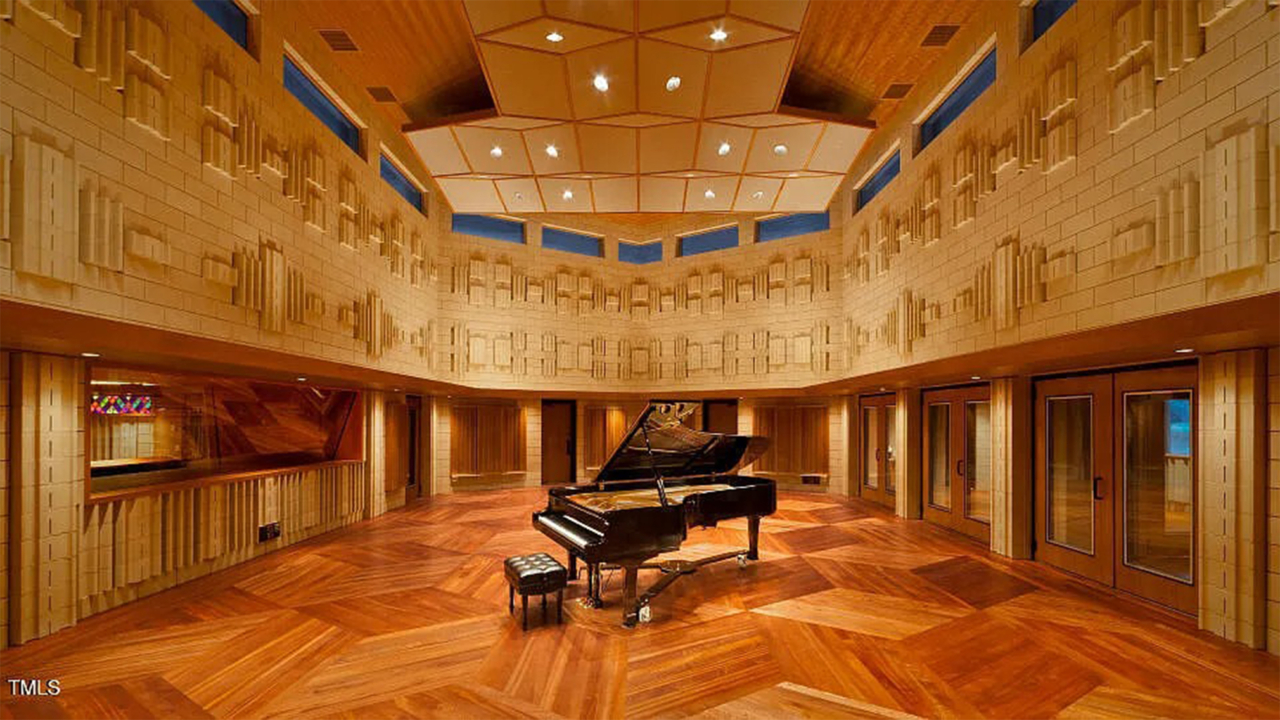How to Buy and Finance a Mobile Home
Considering buying a mobile home? We cover the cost, finance options and what to consider.


Written by Alycia Lucio on October 22, 2024
Buying a mobile home differs slightly from buying a traditional, single-family home. Apart from different financing options, lenders often have different loan requirements. While you may take out a personal loan or pay for the physical mobile home in cash, there is also the matter of renting or buying land. We’ll uncover all you need to know about buying a mobile home, including how much it’ll cost, how to finance it, and the pros and cons.
Mobile home vs manufactured home: what’s the difference?
Mobile and manufactured homes are essentially the same thing, with a different name and more up-to-date safety standards. Mobile homes refer to factory-built homes built on a permanent chassis before June 15, 1976, while manufactured homes refer to off-site homes built up to the new Manufactured Home Construction Safety Standards (HUD Code) after that date. Both are a type of prefabricated home that differs based on the code they are built to.
Beyond construction standards, the change in terminology was also an attempt to shed the stigma associated with mobile homes, as they were perceived as low-quality. Despite this change, mobile homes and manufactured homes are still used interchangeably. Mobile and manufactured homes also come in single-section and multi-section options. Single-section homes, known as single-wides, are manufactured with one singular unit that’s usually smaller and narrower. Multi-section homes, known as double-wides, are manufactured with multiple sections or units before delivery.
How to buy a mobile home
Buying a mobile home typically involves the following steps:
1. Determining your budget
Determining your budget is the first step in buying a mobile home, which means understanding the cost considerations associated with it. As of March 2024, the average cost of a single-section manufactured home was $82,900, and $144,800 for multi-section homes. The average cost of a single-family home in the United States is $361,250 as of September 2024, which is significantly greater.
The average mobile home prices will vary by number of units and region:
| Northwest | Midwest | South | West | |
|---|---|---|---|---|
| Single-wide | $85,200 | $86,200 | $82,000 | $83,000 |
| Double-wide | $141,600 | $142,400 | $140,900 | $170,300 |
The cost of a mobile or manufactured home will also vary based on the following:
- The square footage of the mobile home
- The features included in the mobile home
- The purchase location
- The cost to purchase or rent land
- Site preparation expenses, which typically include ground leveling, building a foundation, and installing utilities
- Delivery and assembly costs, which consist of the cost of transporting the home and setting it up on the property
- Utility hookup costs, such as connecting the mobile home to water, sewer, electricity, and gas lines
- Mobile home insurance, which is similar to homeowner’s insurance
- Property taxes
2. Choosing the location
Choosing the location for your mobile home is crucial. When determining where to put your mobile home, you’ll first want to consider whether you prefer to rent or own the land—or find a land-home option that allows you to purchase a mobile home along with the land it’s already on. If you’re choosing a location outside of a manufactured home community (MHC), land-lease community, or mobile home park, you’ll have to check with your local zoning department to ensure you can have a mobile or manufactured home on the land.
Depending on your land ownership preferences, other things to consider include accessibility to amenities and activities you and your family may want or need, such as schools, parks, grocery stores, medical care facilities, restaurants, retail stores, gas stations, and public transportation.
3. Securing financing
Mobile home financing comes in all shapes and sizes. From conventional loan programs designed for manufactured homes to personal loans, you can easily find a loan program best suited for your financial situation and home purchase needs. Keep in mind, some traditional mortgage lenders do not offer loans for mobile homes. Some of the most common mobile home loan options include Title I and Title II loans, offered through the Federal Housing Administration (FHA).
4. Preparing the home site
If you’re purchasing new land for your mobile home versus a prepared lot in an MHC community or mobile home park, you’ll need to prepare the site before moving in. Site preparation typically includes obtaining the proper permits, leveling the land, setting up utility connections, installing a foundation for the home to be affixed to, and a driveway and sidewalk, depending on your loan and zoning requirements.
5. Obtaining mobile home insurance
Since mobile and manufactured homes have a unique construction that can be more vulnerable to wind and storm damage, you won’t qualify for traditional homeowners insurance. Instead, you’ll have to find mobile home insurance that provides the following:
- Dwelling coverage, which protects your mobile home from damage caused by fires, burst pipes, falling objects, vandalism, explosions, wind and hail, ice and snow, and lightning.
- Other structures coverage, which protects your land’s other structures, such as fences, sheds, and anything not attached to the home
- Personal property coverage, which covers all your personal property within the home up to a certain amount
- Liability coverage, which covers accidents and injuries on your property
Like traditional homeowners insurance, mobile home insurance doesn’t typically cover damage caused by floods, earthquakes, animals or insects, or wear and tear. If you live in a flood or earthquake zone, you may be required to purchase additional coverage before getting land purchase or finance approval.
6. Making arrangements for delivery and installation
It can take anywhere from one to several months to build and deliver your new mobile home, and it usually takes one to two days to install it. The time it takes for your mobile home to be built, delivered, and installed depends entirely on the complexity of the project, the manufacturer’s timeline, and how they handle the transportation. It will also depend on the weather conditions and duration of the site prep. You’ll want to confirm the timeline from construction to delivery and installation with the manufacturer, so you can plan accordingly regarding site prep, financing, and your move-in date.
How to finance a mobile home
Financing a mobile or manufactured home slightly differs from financing a single-family home. These are the most common types of loans for mobile or manufactured homes and their requirements:
Conventional loans
Fannie Mae and Freddie Mac’s affordable homeownership program offers conventional loans for manufactured homes.
The MH Advantage program™:
Both Fannie Mae and Freddie Mac offer an MH Advantage program, which allows homebuyers to obtain mobile home mortgages with fixed-loan terms and 7/1 or 10/1 adjustable-rate mortgages (ARMs) with terms of up to 30 years.
The requirements for this program include:
- The buyer must have a minimum 620 credit score
- The buyer must make a minimum down payment ranging from 3% to 5%, depending on their other financial factors.
- The home must be at least 12 feet wide with a minimum of 600 square feet (with Fannie Mae) and 400 square feet (with Freddie Mac)
- The land must be owned, not leased
- The home’s construction, design, and energy efficiency standards must be consistent with site-built homes, such as having durable siding materials, minimum energy ratings, and distinctive features like porches, higher-pitched roofing, lower-profile foundations, driveways, sidewalks, and garage
The HomeReady program™:
Fannie Mae’s HomeReady program can also finance a mobile home as long as the loan-to-value ratio (LTV) does not exceed 95%. The other requirements for this program include:
- A minimum down payment of 3%
- A minimum 620 credit score
- Borrowers must complete homeownership counseling
The Home Possible Mortgage program:
Freddie Mac’s Home Possible Mortgage program can also finance your mobile home. To qualify for this program with a mobile home, borrowers must meet the following criteria:
- An income below 80% of the median income for the area
- A minimum 680 credit score
- The home may not exceed an LTV of 95%
- A minimum 5% down payment
FHA loans
The Federal Housing Administration (FHA) also offers loans for mobile homes, known as Title I and Title II loans. There are no minimum credit score requirements for Title I and II loans. However, most lenders offering FHA loans require specific credit scores for minimum down payments, such as a minimum 580 credit score to put down 3.5%. Loan limits also apply to these loans for both the mobile home and the lot:
- $105,532 for single-section homes
- $193,719 for multi-section homes
- $148,909 for a single-section home and lot together
- $237,096 for a multi-section home and lot together
- $43,377 for the home lot only
Title I loans:
A Title I loan can finance a new or used mobile home, purchase the property lot, or both the home and property lot. It can also be used to refinance an existing mobile home mortgage. For Title I loans, the requirements are:
- The home must be your primary residence
- The home must meet FHA construction standards before transportation to the rental community or property
- You must establish utility connections before transportation
Title II loans:
Title II loans require you to own or purchase the land before transporting the mobile home. This means you cannot rent a lot in a rental community, like with a Title I loan. However, you can use it to purchase the land and the mobile home simultaneously. The mobile home must also meet the HUD code standards after June 15, 1976, and the FHA standards for permanent foundations on mobile homes to qualify, which include:
- A floor area of at least 400 square feet
- An affixed certification label from the Federal Manufactured Home Construction and Safety Standards (FHCSS), which serves as proof of safety compliance
- Being classified as real estate for state taxation
- Being affixed to a permanent chassis
- It must be specifically designed as a dwelling, built with a permanent foundation that meets the FHA’s criteria
- The finished grade elevation beneath the home must be at or above the 100-year floodplain
- If a basement is used, then the lowest-finished exterior grade adjacent to the home’s perimeter must be at or above the 100-year floodplain
VA loans
Eligible service members, veterans, and surviving spouses can also use VA loans to finance or refinance mobile homes. To qualify for either financing or refinancing, the home must be affixed to a permanent foundation and meet the HUD code standards. You must also purchase or own the land for the home.
USDA loans
Rural homebuyers can also use USDA loans to finance their mobile home purchase or a land-and-home-package purchase. To qualify for a USDA loan for a mobile home, you must meet the following criteria:
- The mobile home must be newly constructed (not used)
- The home must be permanently affixed to a USDA-approved foundation
- The property’s total square footage must be a minimum of 400 square feet
Chattel loans
Chattel loans are designed to purchase moveable personal property, including watercraft, vehicles, airplanes, and mobile homes. They differ from other types of mortgages in that they only finance the moveable property — not the land where it sits. This means you must find other means of financing for the land.
Chattel loans are typically limited to a 25-year term or less, and lenders usually require a minimum 575 credit score. Like a traditional mortgage, lenders want to review your income history, assets, and debt-to-income ratio (DTI) to approve a chattel loan. However, the process is often quicker as these loans come with shorter repayment periods, lower maximum loan amounts, and higher interest rates.
Personal loans
A personal loan may be an alternative option for homebuyers who don’t want a mobile home affixed to a permanent foundation or don’t meet other mortgage requirements. With personal loans, the lender’s approval is based solely on your creditworthiness. This means you can use a personal loan to finance any type of mobile home, even an older one that doesn’t meet the current HUD code standards.
The financial criteria for a personal loan will vary by lender. Keep in mind that personal loan interest rates are often much higher than mortgage interest rates, and some lenders may charge high loan origination fees, usually up to 7%. Personal loan amounts also typically range between $1,000 and $50,000, although it’s possible to find lenders that allow up to $100,000 or even $200,000.
The pros and cons of buying a mobile or manufactured home
The pros of buying a mobile home:
- Mobile homes are generally more affordable than traditional, single-family homes
- Manufactured homes can usually be built to your specifications
- Some mobile homes can be moved if you need to relocate
The cons of buying a mobile home:
- They can be difficult to resell, especially if you don’t own the land
- Older mobile homes can be difficult and more expensive to insure
- You may have limited land ownership, depending on where you place your mobile home
Whether you’re interested in buying a mobile home or a traditional home, the first step is to determine your home-buying budget, and the next is to look into your financing options. See what loans you may pre-qualify for with us at Zillow Home Loans*.
*Zillow Home Loans; An equal housing lender. NMLS #10287
How much home can you afford?
At Zillow Home Loans, we can pre-qualify you in as little as 5 minutes, with no impact to your credit score.
Zillow Home Loans, NMLS # 10287. Equal Housing Lender
Get pre-qualifiedHow much home can you afford?
See what's in reach with low down payment options, no hidden fees and step-by-step guidance from us at
Zillow Home Loans.
Zillow Home Loans, NMLS # 10287. Equal Housing Lender
Calculate your BuyAbility℠
Related Articles
Get a mortgage with Zillow Home Loans
Go from dreaming to owning with low down payment options, competitive rates and no hidden fees. A dedicated loan officer will guide you until you have your keys in hand.

Zillow Home Loans, NMLS #10287. Equal Housing Lender.



